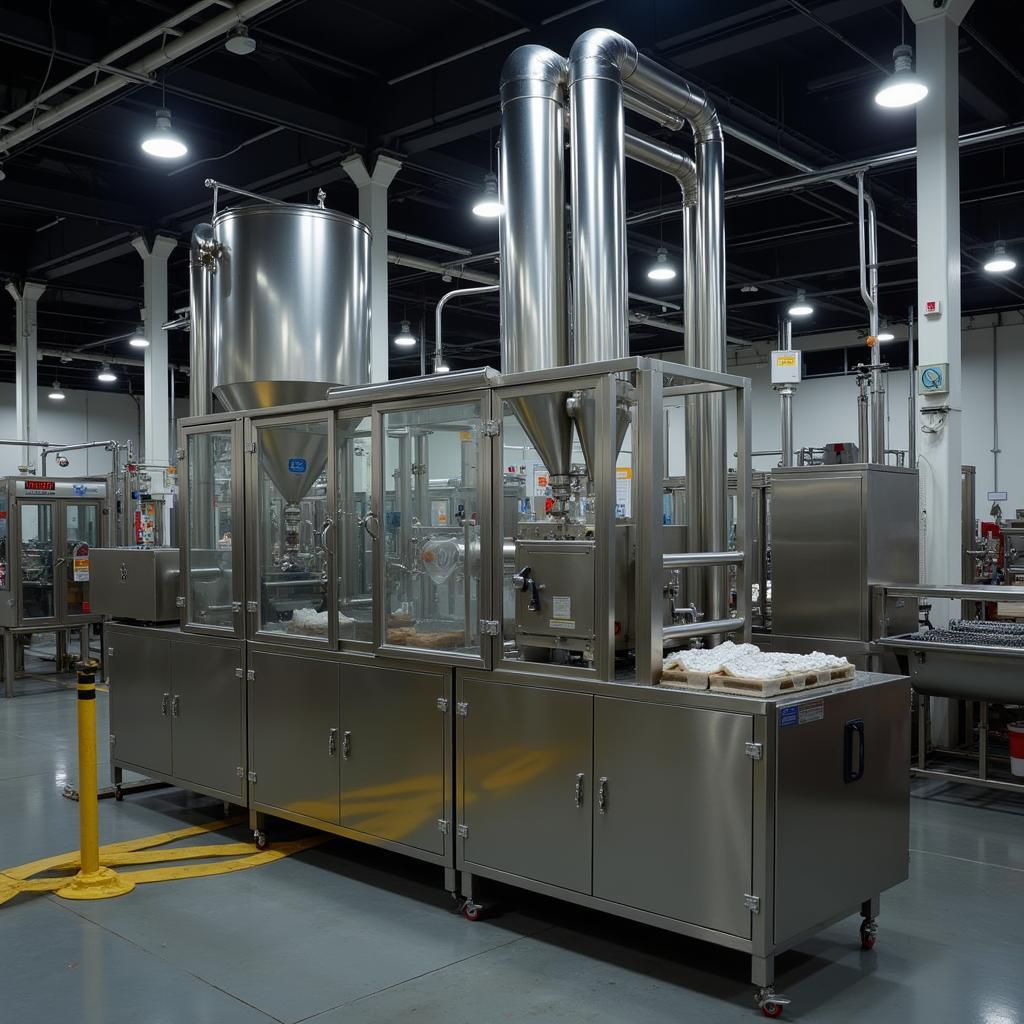An Emulsifier Machine For Food is a crucial piece of equipment for any food processing business looking to create smooth, stable, and high-quality products. From creamy sauces and dressings to perfectly textured ice cream and even some types of bread, these machines play a vital role in creating the foods we love. This comprehensive guide will delve into the world of food emulsifier machines, exploring their benefits, types, applications, and how to choose the right one for your specific needs.
What is a Food Emulsifier Machine?
Emulsifier machines for food, also known as homogenizers or colloid mills, are specialized equipment designed to create stable emulsions by reducing the size of droplets in a mixture of two immiscible liquids, like oil and water. This process prevents separation and delivers a consistent texture and enhanced mouthfeel to the final product. Imagine trying to mix oil and vinegar – without a proper emulsifier, they’ll quickly separate. A food emulsifier machine prevents this, creating a stable and homogenous mixture. food emulsifier machine are essential in achieving this stability.
Types of Food Emulsifier Machines
There are various types of emulsifier machines available, each with its own strengths and ideal applications:
- High-Pressure Homogenizers: These machines force the mixture through a narrow valve at high pressure, creating extremely small droplets and a highly stable emulsion. They are ideal for products requiring long shelf life, like milk and cream.
- Ultrasonic Homogenizers: Utilizing ultrasonic waves to break down droplets, these machines are particularly suitable for sensitive products or smaller batches.
- Rotor-Stator Homogenizers: These are versatile machines that use a high-speed rotor and stator to create a shearing force, effectively emulsifying a wide range of food products.
- Colloid Mills: These machines use closely spaced rotating elements to grind and disperse particles, making them suitable for creating smooth pastes and sauces.
Benefits of Using an Emulsifier Machine
Investing in a food emulsifier machine offers numerous advantages:
- Improved Product Quality: Achieve consistent texture, enhanced stability, and better mouthfeel in your food products.
- Extended Shelf Life: Stable emulsions are less prone to separation, leading to a longer shelf life for your products.
- Increased Efficiency: Automate the emulsification process, saving time and labor costs.
- Versatility: Many emulsifier machines can handle a wide range of products, from sauces and dressings to dairy products and beverages.
Applications of Emulsifier Machines in the Food Industry
Emulsifier machines are used across a wide range of food processing applications:
- Dairy Processing: Creating homogenized milk, cream, and yogurt.
- Sauce and Dressing Production: Producing mayonnaise, ketchup, and salad dressings.
- Bakery and Confectionery: Improving the texture and consistency of batters, fillings, and icings.
- Beverage Production: Creating smooth and stable juices, smoothies, and plant-based milk alternatives.
- Meat Processing: Emulsifying fats and proteins in sausages and other processed meats.
Choosing the Right Emulsifier Machine for Your Business
Selecting the right emulsifier machine for food requires careful consideration of your specific needs. Factors to consider include:
- Production Volume: Determine the capacity required based on your production demands.
- Product Viscosity: Different machines are better suited for different viscosities.
- Desired Droplet Size: The desired droplet size will influence the type of homogenizer needed.
- Budget: Emulsifier machines are available at various price points.
 Large-scale emulsifier machine operating in an industrial food production facility. “Choosing the correct emulsifier machine is paramount for optimal product quality,” says food scientist Dr. Amelia Hernandez. “Understanding your product’s unique characteristics is key to making the right investment.”
Large-scale emulsifier machine operating in an industrial food production facility. “Choosing the correct emulsifier machine is paramount for optimal product quality,” says food scientist Dr. Amelia Hernandez. “Understanding your product’s unique characteristics is key to making the right investment.”
Maintaining Your Emulsifier Machine
Regular maintenance is crucial for ensuring the longevity and optimal performance of your emulsifier machine. This includes:
- Cleaning the machine after each use according to manufacturer instructions.
- Regularly inspecting and replacing worn parts.
- Scheduling professional maintenance checks as needed.
Troubleshooting Common Issues with Emulsifier Machines
- Emulsion Instability: This can be caused by incorrect machine settings, inappropriate emulsifiers, or temperature fluctuations.
- Clogging: Ensure proper pre-filtration of ingredients and regular cleaning to prevent clogging.
- Noise and Vibration: Excessive noise or vibration can indicate a mechanical issue that requires attention. food emulsifier machine require regular maintenance to ensure their continued efficiency.
Conclusion
An emulsifier machine for food is an invaluable asset for any food processing business aiming to produce high-quality, stable emulsions. By understanding the different types of machines, their benefits, and applications, you can make an informed decision and choose the perfect machine to meet your specific needs. Investing in a quality emulsifier machine will not only enhance your product quality but also improve efficiency and boost your bottom line. “With the right emulsifier machine and proper maintenance, you can consistently deliver superior products to your customers,” adds Dr. Hernandez.
FAQs
- What is the difference between a homogenizer and an emulsifier? The terms are often used interchangeably, though technically homogenization is a specific type of emulsification.
- How do I clean my emulsifier machine? Consult the manufacturer’s instructions for specific cleaning procedures for your model.
- What is the typical lifespan of an emulsifier machine? With proper maintenance, an emulsifier machine can last for many years.
- What are common emulsifiers used in food processing? Common emulsifiers include lecithin, soy protein, and various gums.
- What is the cost of an emulsifier machine? The cost varies depending on the type, size, and features of the machine.
- Can an emulsifier machine be used for small-batch production? Yes, smaller models are available for small-scale production.
- What are the key factors to consider when choosing an emulsifier machine? Key factors include production volume, product viscosity, desired droplet size, and budget.
Need assistance? Contact us at Phone Number: 02437655121, Email: minacones@gmail.com or visit our address: 3PGH+8R9, ĐT70A, thôn Trung, Bắc Từ Liêm, Hà Nội, Việt Nam. We have a 24/7 customer support team.